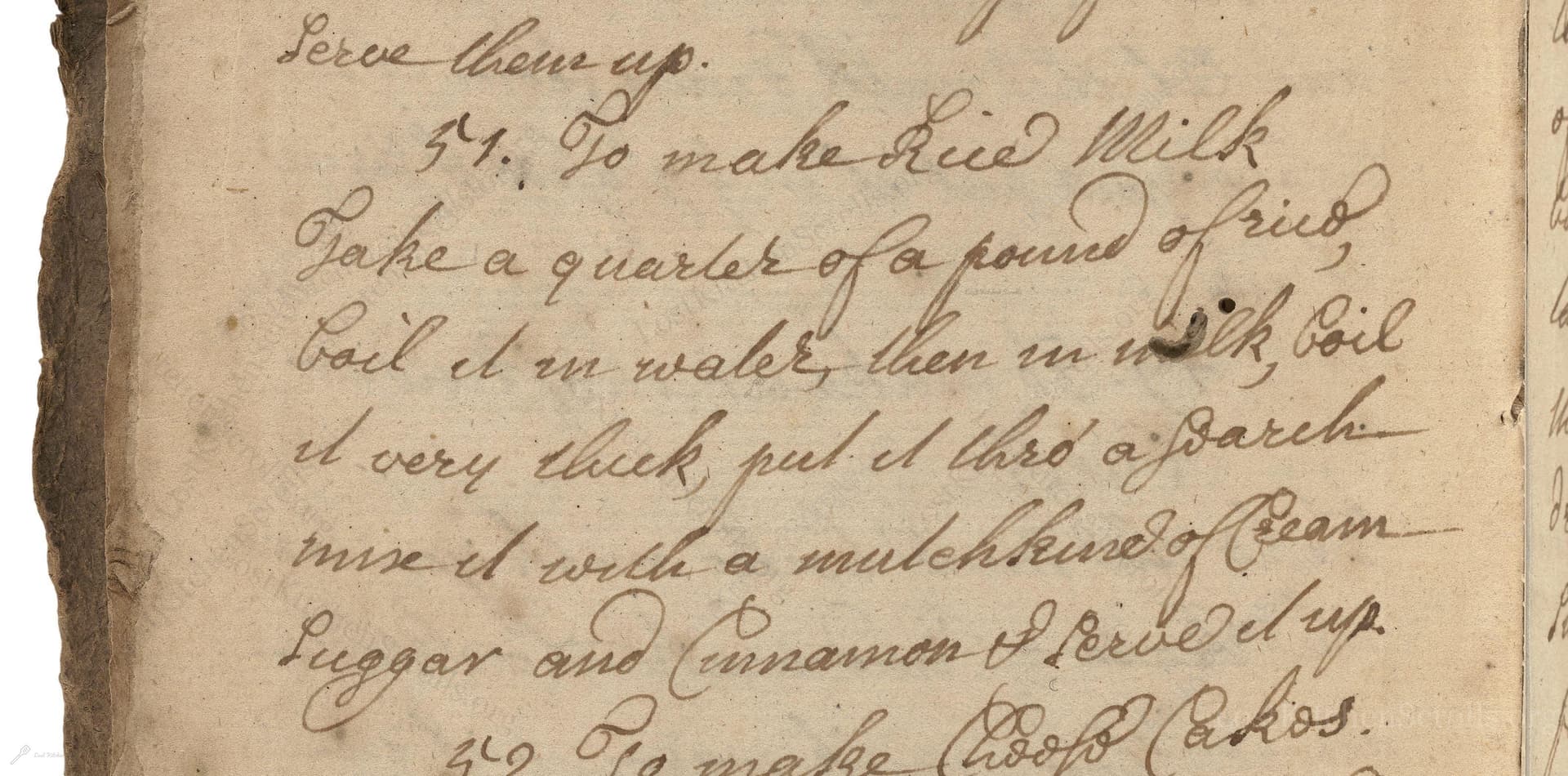To Make Rice Milk
From the treasured pages of Receipts for cookery and pastry work
Written by Mrs. Johnston

To Make Rice Milk
"Take a quarter of a pound of rice boil it in water, then in milk, boil it very thick, put it thro a Search mix it with a mulchkind of Cream Suggar and Cinnamon & Serve it up."
Note on the Original Text
Recipes from the early 18th century were brief and direct; they often assumed readers were experienced cooks, omitting specific measurements, times, or temperatures. Spelling was fluid ('Suggar' for sugar, 'thro' for through, 'mulchkind' for 'much kind of'), and instructions relied on practical kitchen savvy. Measurements such as 'a quarter of a pound' were used, but most other quantities or details were left to the cook’s judgment—and their trusty senses of sight and taste.

Title
Receipts for cookery and pastry work (1700)
You can also click the book image above to peruse the original tome
Writer
Mrs. Johnston
Era
1700
Publisher
Unknown
Background
A delightful compilation of 18th-century recipes gathered by Mrs. Johnston herself, promising a charming journey through the flavors and culinary traditions of the early 1700s.
Kindly made available by
Folger Shakespeare Library
This recipe is drawn from a manuscript compiled by Mrs. Johnston around 1700, a time when English kitchens were exploring ways to enhance the plainness of rice with the rich, sweet, and aromatic ingredients then available. While rice was still something of a luxury, milk and cream puddings were fashionable and comforting to the early modern English palate. Recipes like this showcase both the influence of continental techniques and the increasing British appetite for sweets and gentle spices such as cinnamon.

The original cook would have used a large open hearth or a wood-fired oven, with sturdy iron pots for boiling. A 'Search' referenced in the recipe is a sieve, typically made of fine wire or cloth stretched over a hoop, used to strain and smooth mixtures. Wooden spoons or paddles stirred the thickening rice. Mixing was done in clay or pewter bowls, and serving would be in shallow dishes or bowls.
Prep Time
10 mins
Cook Time
30 mins
Servings
4
We've done our best to adapt this historical recipe for modern kitchens, but some details may still need refinement. We warmly welcome feedback from fellow cooks and culinary historians — your insights support the entire community!
Ingredients
- 4 ounces white rice (uncooked)
- 4 cups water
- 2 cups whole milk
- 3/4 cup double (heavy) cream
- 2 tablespoons (about 0.9 ounces) sugar
- 1/2 teaspoon ground cinnamon
Instructions
- Begin with 4 ounces of white rice and rinse it well.
- Boil the rice in plenty of water (about 4 cups) until it begins to soften.
- Drain the rice, then add 2 cups of whole milk, and continue to simmer, stirring frequently, until the mixture becomes very thick—almost a pudding consistency.
- Push the rice mixture through a fine sieve or food mill to create a smooth paste, discarding any remaining solids.
- In a separate bowl, mix 3/4 cup of double (heavy) cream with 2 tablespoons of sugar and 1/2 teaspoon of ground cinnamon.
- Fold the cream mixture into the rice base until well combined, then serve warm or chilled as desired.
Estimated Calories
270 per serving
Cooking Estimates
The preparation takes about 10 minutes, mostly for rinsing and measuring. Cooking takes about 30 minutes as the rice softens and the pudding thickens. Each serving contains around 270 calories, and the recipe makes 4 servings.
As noted above, we have made our best effort to translate and adapt this historical recipe for modern kitchens, taking into account ingredients nowadays, cooking techniques, measurements, and so on. However, historical recipes often contain assumptions that require interpretation.
We'd love for anyone to help improve these adaptations. Community contributions are highly welcome. If you have suggestions, corrections, or cooking tips based on your experience with this recipe, please share them below.
Join the Discussion
Rate This Recipe
Dietary Preference
Culinary Technique
Occasions

Den Bockfisch In Einer Fleisch Suppen Zu Kochen
This recipe hails from a German manuscript cookbook compiled in 1696, a time whe...

Die Grieß Nudlen Zumachen
This recipe comes from a rather mysterious manuscript cookbook, penned anonymous...

Ein Boudain
This recipe comes from an anonymous German-language manuscript cookbook from 169...

Ein Gesaltzen Citroni
This recipe, dating from 1696, comes from an extensive anonymous German cookbook...
Browse our complete collection of time-honored recipes



